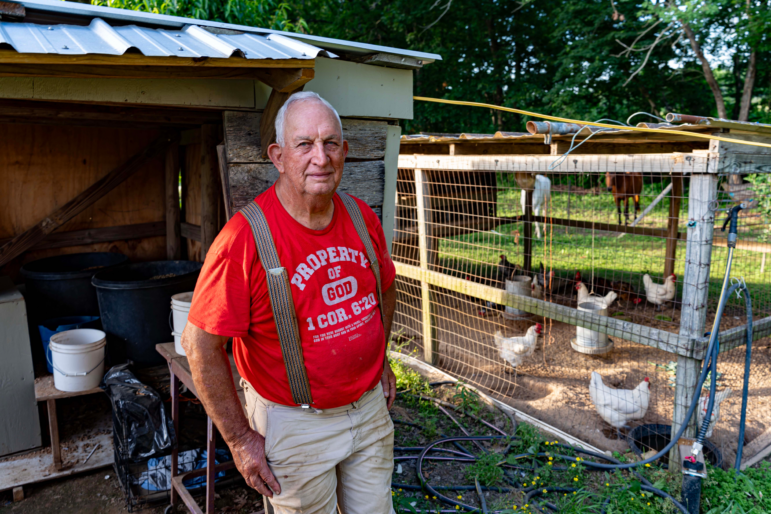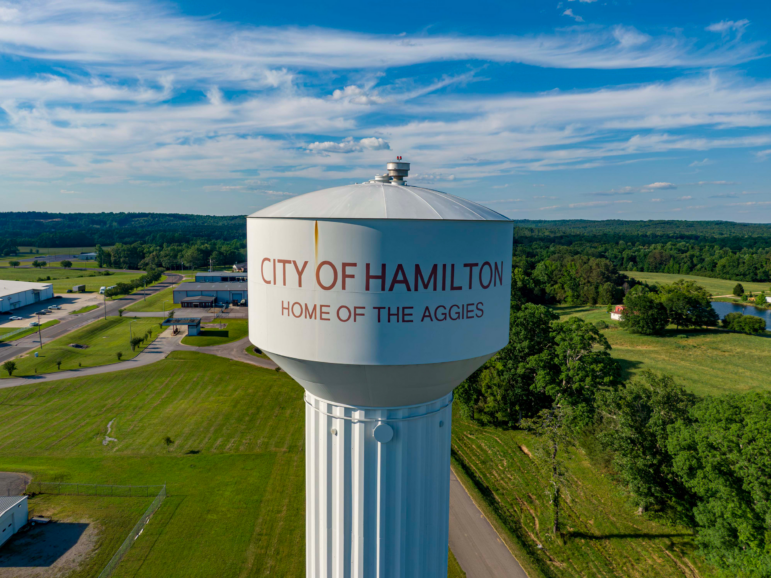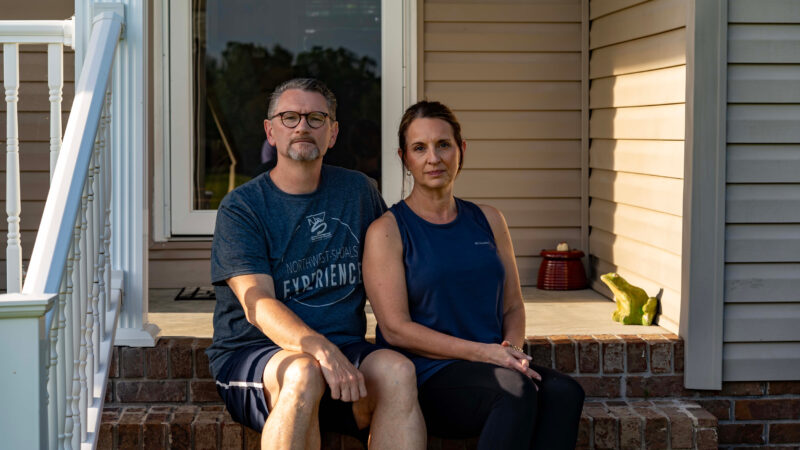Thousands across Alabama live without access to public water
Michael and Mindy McClung said they regret building a home in Marion County with the hope that public water would soon be installed. Well over a decade later, they're still waiting.
This article originally appeared on Inside Climate News, a nonprofit, independent news organization that covers climate, energy and the environment. It is republished with permission. Sign up for their newsletter here.
By Lee Hedgepeth, Inside Climate News
MARION COUNTY, Ala.— As often as they can, Michael and Mindy McClung get outside and walk along the quiet roads of their neighborhood. Both educators—Michael at a community college and Mindy at a high school—they talk as they walk. As he often does, Michael soon circles back to Cormac McCarthy, his favorite author. Mindy smiles.
“Can you imagine the lectures I get?” Mindy asks.
Michael carries a short length of PVC pipe in case the loose dogs they encounter begin to fight each other, but soon, with no fight to break up, they stop halfway to the road and point out their saving grace—the only thing keeping the water flowing in their home: a private, drilled well on Mindy’s father’s property.
They’re not alone. In unincorporated Marion County, around 800 to 900 households—approximately 40 percent of all homes—do not have access to public drinking water, according to government estimates, a figure one water expert called “staggering.” But families like the McClungs are faring better than others, said Rep. Tracy Estes, a Republican who represents Marion County in the state legislature.
Across Alabama, around 800,000 people—about 20 percent of the state’s population—rely on private water supplies, like wells, for drinking water, according to state estimates. That reality often has socioeconomic and racial implications, too. In some places, such as Athens, just under 100 miles north of Birmingham, and Prichard, just north of Mobile, most whites have reliable municipal water and sewer service while many Black residents suffer from deteriorated or nonexistent water infrastructure. In rural Marion County, where around 94 percent of residents are white, connections, money and power often determine where the water flows, according to residents.
There are other risks, too, as a rapidly warming climate brings heat waves and drought, extreme weather and flooding. So far, the McClungs have been lucky. The drilled well, which goes more than a hundred feet into an underlying aquifer, has never run dry, even with increased demand, and even in the hottest of summers. More than once, it’s even filled up a swimming pool.
But summers, they recognize, are getting hotter. As many as one-fifth of the world’s wells are at risk of drying up in the near-term, researchers have concluded.
Mindy’s dad, Marshall Emerson, has allowed home after home to tie into the well over time, providing County Road 138 with the only running water the neighbors have access to. But there are worries.
Emerson, feeding his chickens as the McClungs approach, explains the obvious.
“What happens when something happens to us?” Emerson asks. “I worry about it for them.”
If his property falls out of family hands, there’s no guarantee that the McClungs—or anyone on County Road 138—will have continued access to well water. Instead, a new owner could unhook the PVC fittings or simply turn off their valves.
Then, there’s the already unavoidable. Wells like this one, unlike most public water supplies, require an electric pump on site to force water out of the ground and into nearby homes. When the electricity goes out, so does the water.
And over time, every few years, that pump has to be replaced, too, its mechanisms burned out from what is a nearly continuous job. Those costs fall on Emerson, a grandfather and Vietnam veteran who retired after 50 years in the liquid petroleum gas business, and while the McClungs help where they can, the family feels they all deserve a shot at something they believe should be a given in 2024: access to public water.

Emerson, 80, has always told his family members to hold on to hope.
Marion County or the nearby City of Hamilton, he’d tell them, would run water to their homes soon enough.
“He’s been saying it for years, holding on to hope, but here we are today,” Michael says. “There’s still no access to public water.”
‘It’s not even close’
Emerson’s hopes didn’t seem outlandish. Through the years, public water lines in Marion County, a rural county in the northwest part of the state, had extended toward the family’s properties, reaching all but County Road 138, the road where McClung and Emerson live. But the water’s never come far enough, leaving the family and the more than half dozen homes on the road to rely on a single well, spider-webbed with PVC connections, to supply enough water for drinking, bathing, and everyday life.
In Marion County, water officials are at a loss to explain why incremental, expanded service has reached some homes and not others. Plans have been made to expand local wells, and then been discarded, thanks to a dearth of local funding, while Rep. Estes, outraged, worries about the calls he gets regularly from residents without public water access.
“I’ve had mothers cry with me about trying to bathe their children,” Estes said. “I’ve had mothers cry with me talking about trying to cook a Thanksgiving meal and having to go somewhere else and bring the water back to their house so they can even cook.”

A “reasonable Republican,” as some members of the community call him, Estes became a legislator after working for decades as a journalist for newspapers across Alabama. Talkative and upbeat, Estes still had to fight for his seat in the state legislature, winning his primary runoff in the deeply red district by only 139 votes.
After nearly six years in the Alabama House of Representatives, Estes said access to water is the number one reason citizens in his district reach out to him: “It’s not even close.”
Still, a comprehensive solution seems just out of reach. Tensions around water access heightened earlier this year when a deep freeze ruptured various water lines in and around the county seat, Hamilton, exposing vulnerabilities in a water system that was already stressed. Following that crisis, which left many residents without running water for two weeks, local leaders including County Commissioner Keith Nichols attended a meeting of the Marion County Water Authority to demand accountability around water reliability and expanding access to public water for all citizens.
“These people don’t have water, and you don’t have a plan,” Nichols told Jan Cummings, the longtime manager of the water authority, the frustration apparent in his voice.
“Yes I do,” Cummings replied.
“No, you don’t …” Nichols said. “But I’m going to fight for my people.”
The road
For those without access to public drinking water, the road isn’t always smooth.
“If you obtain drinking water from your own well, you alone are responsible for assuring that it is safe,” the Alabama Department of Health has said.
Leigh Terry, an assistant professor in the civil, construction, and environmental engineering department at the University of Alabama, said one of the biggest threats to groundwater used by families like the McClungs is microbial contamination, something that can only be confirmed through scientific testing.
“You can’t smell it or see it,” Terry said. “You’re not going to see the pathogens in the water.”
Michael McClung said the family has never tested their well water.
“I suppose that since no one’s ever gotten sick, we figure it’s good,” he said.

Terry said McClung’s attitude is a common one, mostly due to a lack of education on the inherent risks and responsibilities involved in continued use of private water sources. In addition to microbial risks, there are chemical contaminants that could also pose risks, Terry said, including potentially harmful chemicals like heavy metals or PFAS, so-called “forever chemicals” that the federal government has now recognized as being linked to deadly cancers, impacts to the liver and heart, and immune and developmental damage to infants and children.
These pollutants, Terry said, can be and are present in some public water sources, but utilities have the responsibility and know-how to begin dealing with contamination in ways that private well owners often don’t.
There are exceptions, Terry explained, like municipal water systems in cities like Jackson, Mississippi, that have had infrastructural and management breakdowns. But on the whole, access to a public water source relieves the burden of testing and treatment from individuals, placing it instead on the water utility.
In Tuscaloosa, where the University of Alabama is located, water operators are trustworthy, Terry said, and have a source of water that has historically proved clean and reliable.
“So there’s more of an advantage there than me having a private well in my backyard that I’m testing,” she said. “The City of Tuscaloosa is doing it all for me.”
Michael McClung recently attended a Marion County Water Authority meeting to gently remind its board members, many of whom he considers friends, of the family’s situation. They’ve been waiting for years, he explained.
“We badly need help,” he told board members at a meeting earlier this month. “We’re not asking for special treatment.”
Each time Marion County has expanded its water lines in the decades they’ve lived on County Road 138, their homes have been passed over, McClung told the members, while neighbors nearby have gained access.
“So we’re asking for the same treatment that other families have gotten in our area,” McClung said. “The same service that rural families in Colbert County had in the 1970s. The same services that rural families in Franklin County had in the 1990s. I have friends there who live farther out than we do who got water in 1993. Unbelievable. The fact that I’m still pleading for water in the year 2024 is inconceivable.”

McClung’s plea was met with the next agenda item—the approval of the minutes.
“Has everybody had a chance to read the minutes?” a board member asked.
But it’s not the first time board members have heard from frustrated residents. Even some public officials have become wary of the board’s intentions.
A fiery meeting
A February 2024 board meeting left officials in a shouting match, with county commissioners and residents coming in person to demand answers following a collapse of the public water system in the wake of a hard freeze. The freeze had ruptured various water lines, leaving some residents without any access to running water for weeks. The incident, residents and public officials told Inside Climate News, was a catalyst, bringing what they view as much-needed attention to a neglected water infrastructure that simply doesn’t reach a large number of rural residents.
During the meeting, Nichols’ frustration boiled over.
The commissioner laid out his concerns in detail, mentioning, for example, that the water authority had rebuffed the commission’s offer of a million dollars to help expand public water access across the unincorporated parts of the county.
“Four hundred people in district one does not even have water,” Nichols told water authority board members. “And y’all are telling me you don’t want our money?”
Board members told Nichols a million dollars wouldn’t cut it.
“Then we’ll go get more,” he told them.

Jan Cummings, the system’s manager, said that funding obtained through the Alabama Department of Environmental Management would be the best way to expand water access.
According to documents reviewed by Inside Climate News, local water officials were working on a plan that would have included the drilling of two large wells—one in the west part of the county and one in the east—that would have been used to supplement the water supply and help expand access.
Commissioners and residents at the February board meeting argued that plan was too risky, given the uncertainty involved in reaching and maintaining access to groundwater. Instead, they argued, water officials should tie into neighboring Franklin County’s water supply, which they said is not yet pumping anywhere near its capacity.
Estes said that a chunk of the funding would have also gone to improving water meters, which left some involved scratching their heads.
“That seems much less important than getting water for the very first time to roughly 900 homes,” he said.
Now, Estes said that local and state officials have now agreed to exchange money secured for the well plan for money that can be used to tie into the neighboring system and expand water access, even if it results in a loss of some funds.
Some members of the water authority opposed that plan, Estes said, suggesting the decision was politically motivated. But Estes said it’s just the right thing to do.
A representative of the county water authority said Cummings was unavailable for an interview for this story. A spokesperson for ADEM said that a revised application for the grant funds has not yet been submitted by local officials.
“There’s no excuse in 2024 for such a large percent of the population, even in a rural county, to not have access to drinking water,” Estes said.
The rime
Michael McClung agrees, and he’s worried about others across the county that may not even have reliable access to clean well water.
In 2021, commissioners heard from residents whose well water contained enough iron to stain their tubs and clothes. The officials passed laundry and other items across the dais, commissioner to commissioner, seeing the tangible impact of a lack of access to clean water in their communities.
And Estes said he’s concerned about wells simply running dry. He’s already heard from residents whose supply runs “extremely low” during hot summer months.
Terry said that’s an issue UA’s Alabama Water Institute is studying, particularly given Alabama’s lack of centralized planning around water use.
In 2017, Gov. Kay Ivey disbanded the Alabama Water Agencies Working Group, which had begun digging into water policy issues in the state. That decision was widely criticized by water experts and environmental advocates.
“Less than a year after one of the worst droughts in the history of our state, the Governor’s decision to put the brakes on an already overdue and lengthy process sets all of Alabama back in the progress that’s been made to date,” Sarah Stokes, an attorney for the Southern Environmental Law Center, said at the time. “Instead, the governor states she will rely on the current policies, which have been consistently ineffective in the past. These policies do not ensure any protection during droughts, nor do they ensure that statewide water users are using our limited resources efficiently.”
Seven years later, the state has done little to move water policy forward. The most recent report published on the website of Alabama’s Office of Water Resources, one of the only state offices with authority over water issues, dates to before the disbanding of the working group in 2017.
The situation in Marion County, which isn’t unique among rural areas in the state, leaves Estes a busy man.
Calls from constituents about water woes are difficult calls to take, Estes said, but it’s his job to take them.
He always expresses his condolences, he said, then tells them the reality. He lives in the city limits of nearby Winfield with access to public water, so he can’t fully appreciate what they’re going through. But there’s one thing he can promise them:
“As long as I’m in office, this is going to remain my number one priority, because as important as everything else is that we work out in our respective legislative districts and even what we do in Montgomery—my goodness. You would think people need something to drink, something to wash their clothes, something to prepare their food with, something to bathe their children. To me, in 2024 Alabama, that should be something we no longer even have to think about.”
But for now, Emerson and the McClungs will continue to wait, the same as they’ve done year after year.
As English teachers, the McClungs said they know well the words of poet Samuel Coleridge-Taylor’s “Rime of the Ancient Mariner”: “Water, water everywhere, nor any drop to drink.”
Mindy McClung hopes it’s not the rime of their future.
“I like Wordsworth better anyway,” she said.
Peer pressure can make this clownfish change its stripes
Tomato clownfish, in response to an unpredictable world, appear capable of adjusting when they lose their stripes based on cues from other fish and their habitat, a new study in PLOS Biology finds.
Hezbollah strikes Israel as American and Israeli planes pound Iran
Iran and Iranian-backed militias fired missiles at Israel and Arab states, apparently hitting the U.S. Embassy compound in Kuwait, while Israel and the United States pounded targets in Iran on Monday.
Lesley Manville says her stage and screen careers ‘feed each other’
The decorated British actress discusses her new film Midwinter Break, her role in Oedipus on Broadway and how she balances stage and screen.
Texas primaries could test whether Latino support for GOP is holding after 2024 gains
The GOP made big strides with Latino voters in 2024. Immigration and the economy were key drivers, but two years later, those issues could sway them to back Democrats in primaries happening this week.
Congress gears up for vote on Trump’s war powers in Iran — after the battle began
Democrats and a few Republicans are calling for curbing Trump's unilateral use of military power in Iran, despite previous such efforts failing to advance.
Got elbow or heel pain? Shockwave therapy can help
As more people stay active as they age, overuse injuries are increasing. A non-invasive treatment known as shockwave therapy can help ease heel and elbow pain. Here's how.






